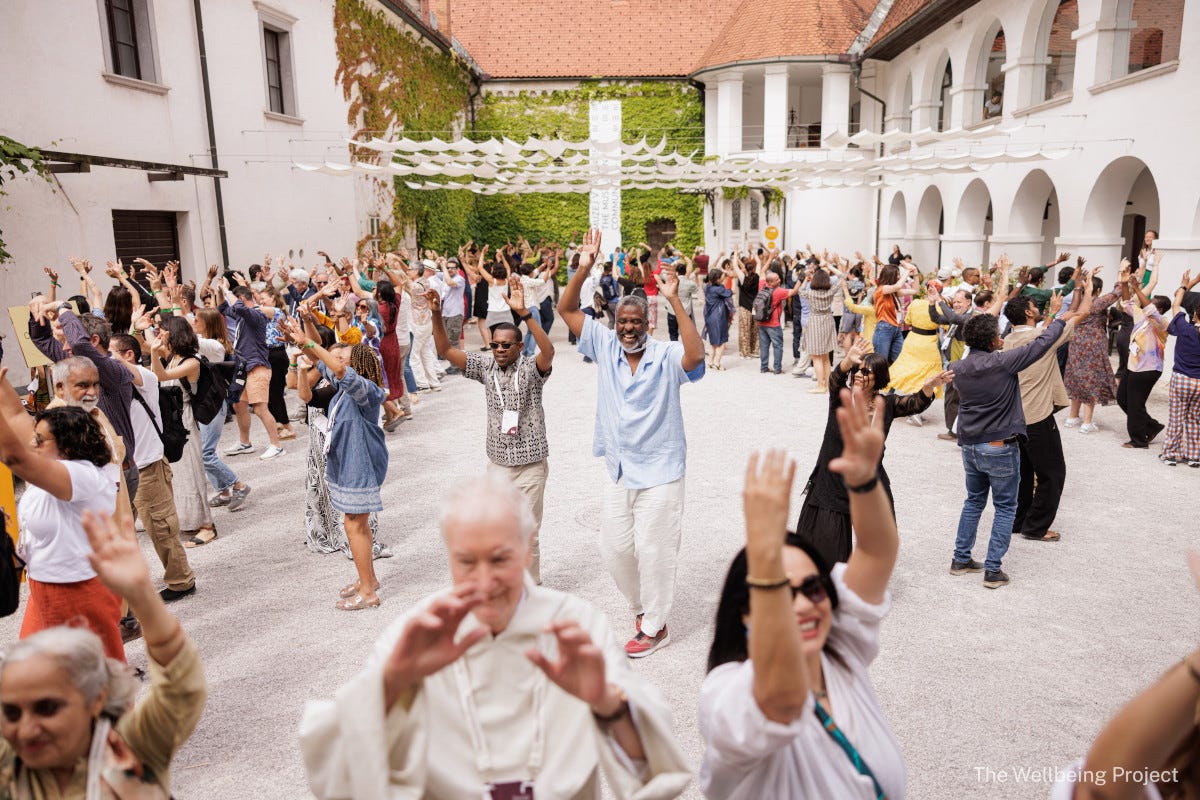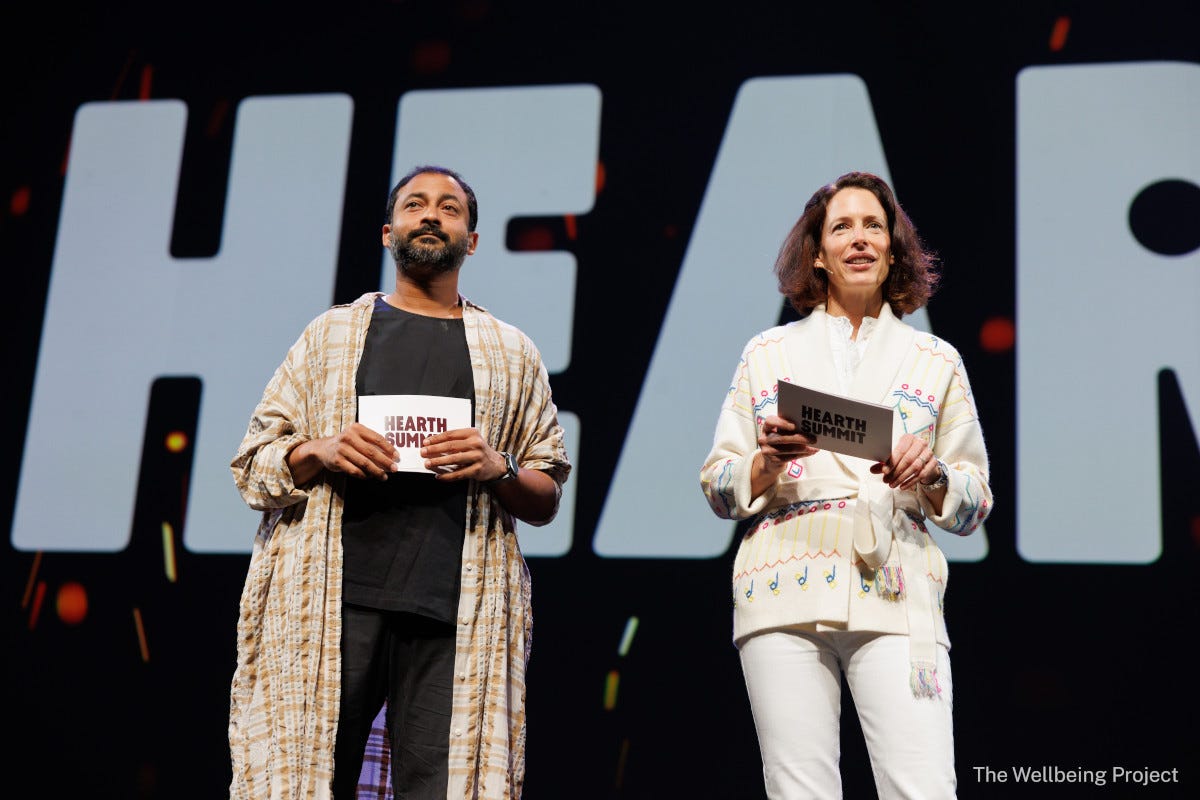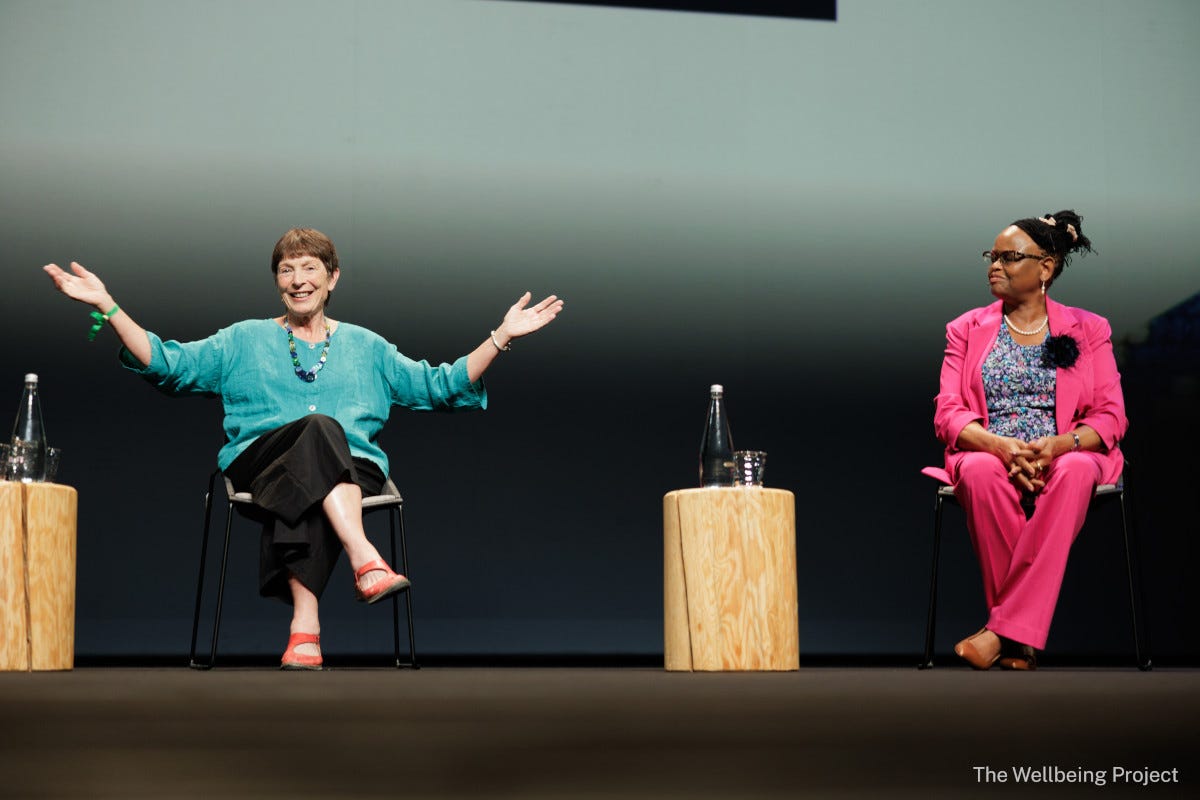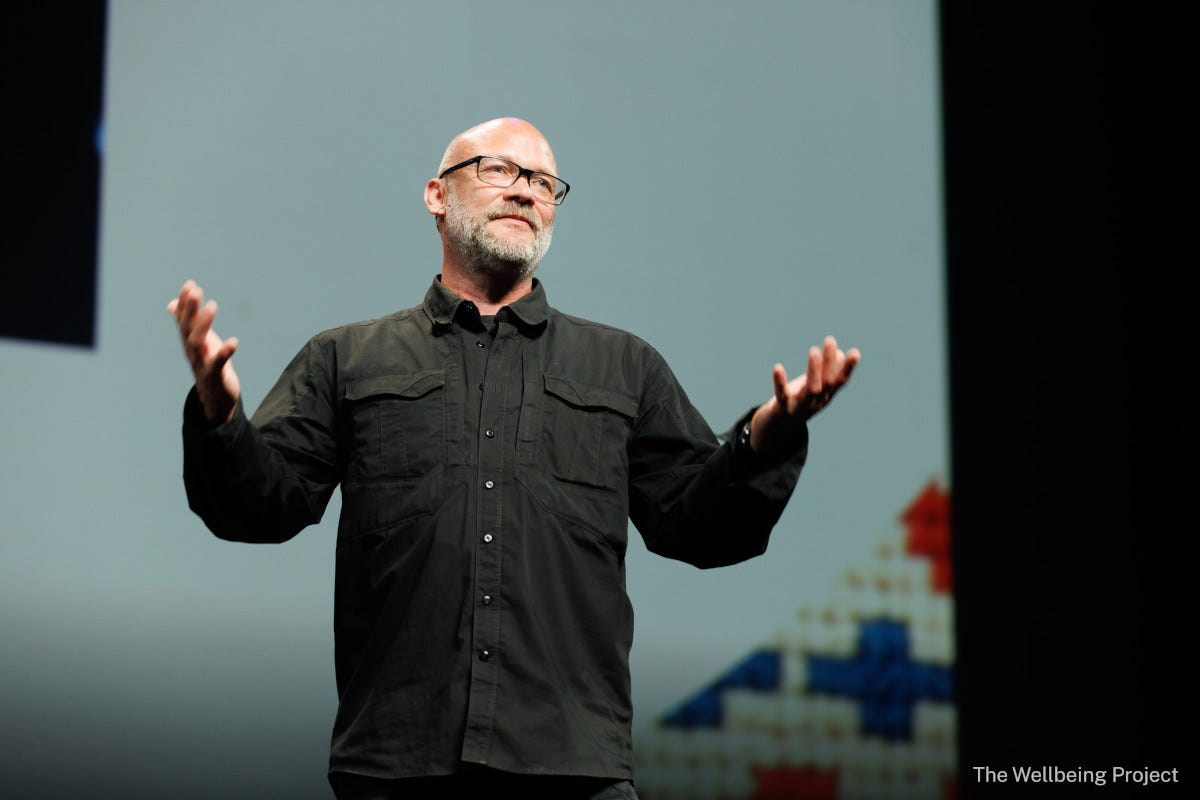Ljubljana, the capital of Slovenia, hosted a monumental event, which (almost) no one from my circles knew about. On June 20th, Hearth Summit concluded as inconspicuously as it began and the picturesque attendees from all around the world went to their far-away homes. I was surprised how few Slovenians were among the participants. I was even more surprised by the meager coverage in the Slovenian media.
For four days, a thousand of us occupied Cankarjev dom. The opening concert with a superb dinner took place in Križanke, while on the following days dinners with music took us to the Grand Hotel Union and Ljubljana Castle. I was overwhelmed by all the fantastic lectures and music.
“Hearth” relates to the fireplace and symbolizes home. It combines “heart”, “art,” and “Earth”: a truly fitting word to name a summit dedicated to the well-being of the world and people, especially those who, through their efforts, strengthen the common good in the broadest sense of the term.
A feast for the soul!
The format of the summit dynamically blended fifteen-minute lectures, similar to those you probably know from TED, musical segments (also poetry, drama, and dance), and roundtables, which the facilitators skillfully wove into an artistic pattern. The afternoons offered a dozen in-depth thematic events in smaller groups, the mornings were dedicated to movement and art, and in the evenings, we socialized with even more magnificent live music and food.
The quality of the production truly blew me away. The organizers ensured a holistic experience from start to finish, and every bit of the program was carefully planned. Even the coincidences found their right place within dozens of unpredictable exchanges of gazes and of ideas.
Among the speakers were prominent figures, lesser-known activists, and a diverse representation of a multitude of change-makers. It pleased me that the minority of stories came from Europe; most were from far away, from countries and circles I don't often interact with.
Bridge over troubled water
The intention of the meeting was perfectly set on track by the Songs of Solomon choir with Bridge over Troubled Water, which begins with the words:
When you’re weary
Feeling small
When tears are in your eyes
I will dry them all
I'm on your side
The state of the world is anything but rosy, so it was good to be reminded of how significant the support from fellow humans is and why we can only weather the stormy seas together. The choir repeatedly brought us to our feet with spirited tunes, and later, Dr. Richard J. Davidson underlined the importance of music for our well-being.
Mai-Nadine Nguyen’s story about trusting in seeds made me cry. Her mother managed to escape from the then-ravaged Vietnam, but only on her third attempt. Even then, the engine on the refugee boat broke down, and they survived for two weeks with almost no food. They ate everything they could, except seeds.
The seeds symbolized hope, as they would turn into harvests that had nourished their ancestors, once the drifting boat hit the shore. Imagine what it was like to flee home in a crisis situation and not forget to carefully pack the seeds.
Mai-Nadine now lives and farms in California, protecting sixty types of grains from oblivion, even though she says only ten can be legally grown in that state. She is driven by the enthusiasm of visitors who recognize in each grain the exact flavor from their homeland, and such flavors simply can’t be conjured from the generic everyday flour.
I cried because she made me think about the ripe seeds of Istrian cabbage, planted by my now deceased mother. I left the seeds to ripen fully, hoping they would not scatter while I attended the Hearth Summit. They held out! I collected them and put into paper-wraps, so I can share them with many people who appreciated my mother. Istrian cabbage is a perennial and this particular one is truly special, because it grew from a crack between rocks, survived many droughts and got eaten down to the stem by deer every year. No matter what, it bounced back into thriving again and again. Such a robust plant will undoubtedly have robust descendants and its boundless tenacity strengthens my confidence that I’ll weather the rough seas—that we’ll weather them.
Trauma is not the end of the world
Dr. Jean Bosco Niyonzima is a survivor of the Rwandan genocide. He dedicated his life to healing collective trauma through the Ubuntu Center for Peace. He has seen the greatest atrocities a human being can commit. His personal healing has been aided by Eastern spirituality, inspiring an innovative methodology that addresses the widespread trauma in Rwandan society.
He told the harrowing story of a man who ended up in prison after the genocide for murdering dozens of people. When he returned home after more than twenty years, he was paralyzed by guilt. Therapy helped him rise above guilt and reintegrate into society productively. This, of course, required healing in the entire community and nurturing shared trust in the former criminal.
David Simas emphasized the need to listen to people who think differently than we do. During the Obama administration, David’s job was to listen carefully to the public and report back to the president what he heard—without any filters. Barack Obama listened to the critical voices, such as the discontent of an evangelical mother because the school system disagreed with her raising her children according to her values; or the complaints of an oilfield worker who felt forced to buy an electric car even though he couldn’t really afford it.
The president's job is to help people hear each other across the divide. Obama once said after the killing of five police officers: “When a black mother gets a call at two in the morning, she knows exactly what it's about. When a police officer's wife gets a call at two in the morning, she knows exactly what it's about.” Compassion and mutual understanding are key to building bridges in times of conflict.
A fart on a plane
Dr. Bayo Akomolafe’s poetic philosophical lecture invited us to embrace the fractured and confused nature of this messy world, because that’s how we maintain contact with it. Even the birth itself takes place in goo and blood as the mother passes onto her baby the bacteria to make her human. Bayo said, “If there were an app where I could press a button and get rid of trauma, I wouldn't press it.”
Instead of resorting to ‘solutionism’, we should hold the space of trying and failing, in other words, of exploring. The politics of failure stimulates inner transformation by which we might be able to break out of the death spiral. Like ants, we are caught in a pheromone trap: we walk in circles blindly following others. We hope to reach our home, but walking endlessly in circles exhausts us to death.
“Have you ever experienced a fart on a plane?” Bayo playfully changed the subject. When you smell a fart on a plane, you look around and make sure to signal that it wasn't you. Often, you do the signaling even when you are to blame.
You want to weasel out of suspicion and avoid taking responsibility for your misdeed because that’s what everyone does. But imagine an airplane where passengers, together, take responsibility for all of their farts. Farts are an inevitability in a large aluminum tube flying ten thousand meters above the sea. Relax, fart, and smile at your neighbor—our modern society desperately needs this. I see it as a kind of “peace manifesto”.
When justices serve justice
Martha Koome, Chief Justice of Kenya, and Jane Davidson, a former Welsh minister, shed light on the state of the judiciary in relation to people’s well-being. Martha grew up in a small village, but later she made it to university, worked as an assistant in law firms, ultimately becoming the Chief Justice of Kenya. Jane has championed the cause of wellbeing in Welsh law, making Wales the world’s first country to formally recognize wellbeing and the protection of future generations, setting an example for many governments and firms.
As an assistant, Martha initially worked on “less important” cases concerning women and children. She was shocked seeing how weak the legal protection of the most vulnerable was, so she decided to stand up for them. In Kenya, justice only served the privileged 20%, not the majority that needed it most. To date, Kenyan law has made important steps towards giving all citizens access to justice.
The testimony of two senior lawyers who understand the importance of well-being gave me hope that humaneness for all can and should be expected from legal institutions.
A similar example is the protection of nature reserves in India, such as the Nilgiri Mountains, which extend over 2500 km2 and reach heights of 1000 to 2600 m above the sea. A special feature of the mountains are tea plantations, where people and wild animals coexist, including deer, bears, panthers and tigers. Many regions around the world where wild animals live close to towns can learn a lot from Nilgiris!
Anarchist grandmother
For me, the highlight of the summit was the story of Finnish architect Marco Casagrande. In 2003, he stood up against the demolition of an informal settlement of 400 households in Taipei called Treasure Hill. The city authorities had already bulldozed many illegally built houses and streets, but Marco joined the effort to stop the destruction. In the settlement, he found exactly the solutions that the authorities were looking for from architects. It would be insane to demolish an already existing urban laboratory of the future!
The residents of Treasure Hill composted all organic waste. They did steal electricity and water from the grid, but minimally, certainly less than normal losses. They treated all wastewater and reused it as urban farmers. They were also urban “nomads”: they wandered around collecting discarded resources (i.e., “garbage”) to recycle or reuse them.
The Treasure Hill Restoration Initiative mobilized volunteers from local universities to talk to men at nearby construction sites. The workers let them steal some building materials, and so began the restoration of the connections between the houses, which had by then been thoroughly demolished by the city authorities. The urban nerve network was quickly revitalized and brought to life.
Rumors were a key tool in the renovation. “We can shape entire cities based on rumors,” Marco pointed out. “Rumors attract activists, activists attract the media, and the media attract politicians.” Finally, politicians came, boasted about the project’s exceptionality and legalized it even though it didn’t meet building regulations. The houses were declared as “works of art.” So, the inhabitants don’t live in a settlement, they live in art.
Marco emphasized the difference between the original, matriarchal city that emerges from the organic givens in the environment, and the secondary, patriarchal city that is created by the technological man, “independent” of nature. The third phase is built on the ruins of the second, basing it on the human connection with nature and intertwining them both.
Communal gardens, urban farms and illegal communities are often matriarchal, while industrial cities are very patriarchal. Treasure Hill was of course led by an anarchist matriarch, 86-year-old Mrs. Cheng. Marco gradually gained her favors, and thus won the locals to his side as well. Without her support, the locals would never have taken him seriously.
From artificial to organic
Organic communities are kept alive by wise women (and men!) who are firmly rooted in objective reality. This kind of wisdom is essential in both the first and third phases of architecture.
Children are also a measure of the quality of urban spaces! Selva Gürdoğan Thomsen asked us a simple question: “Where did you play as children?” The vast majority of us played outdoors and without our parents present. Urban planners are thinking wrong when they build specialized playgrounds. All that children need is their parents' permission, an open space, and friends; those three provisions are enough for free, limitless play.
Without open spaces and friendship, there is no healthy society. Especially when we are lost. This is recognized in the last lines of Bridge over Troubled Water, which say: “Oh, if you need a friend, I'm sailing right behind.”
I made a dozen new friends, no more. I could have tried to network with hundreds, but I preferred to bond deeper with just a few. The first night, I spent an hour smoking a cigar with a German gynecologist. I did it for the very first time in my life. The second day I had lunch with a Canadian woman, and the third day with a young Cambodian and a Japanese. I built bridges over troubled water with an American, a Brazilian, a Nigerian, a Bosnian, a Scot, a Vietnamese, an Indonesian, a Colombian and a Dane.
South African Nina Hastie made me laugh, Jamaican musician Sticky Rice made me dance, I was grounded by the New Zealander Donna Kerridge, and charmed by Indian Mallika Dutt. I was disturbed by the debate between Imam Hendi and Rabbi Lynn Gottleib, shaken by Aakash Odedra’s dance.
Many sparks flew from the hearth. At least one warmed my gut, and I can't help but pass it on. “To find the way, I must first get lost,” I remind myself with a whisper. I am chewing on the edges of my inner sense to catalyze new capacities.









What a wonderful event to be part of. Thank you for bringing it to our attention, Nara. It reminded me how vitally important it is to stay aware of such meaningful initiatives, especially in contrast to the constant stream of media propaganda broadcast around the clock.
Best wishes